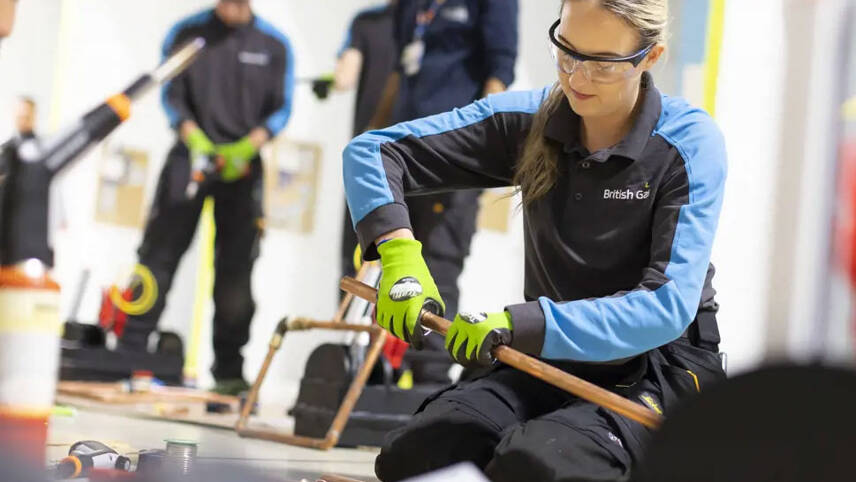Register for free and continue reading
Join our growing army of changemakers and get unlimited access to our premium content

Image: Centrica
The UK Government has not provided a comprehensive update to its skills strategy since legislating for its net-zero target in 2019. Businesses, academics and policymakers have long been calling for such a strategy, to ensure that the economic and social benefits of the low-carbon transition are maximized.
In the same week that the Prime Minister confirmed plans to limit the number of places available on university courses with lower levels of post-graduation employment, Centrica and trade union GMB have issued a document calling for an education system that prepares learners for skilled jobs in the low-carbon transition.
Centrica’s group chief executive Chris O’Shea said: “”Meeting the UK’s energy ambitions requires bold action, and we must move with urgency to create the next generation of well paid, skilled jobs while ensuring that no worker or community is left behind on the path to a greener future.”
There are 48 recommendations in the report, which sets out the potential for job creation and levelling up in growing sectors such as electric heating, energy storage, hydrogen and renewable electricity.
A key call to action is the creation of a new strategic body for the energy sector to oversee skills strategy.
Also chief among the recommendations is the creation of an investment plan to rival those developed by the US (Inflation Reduction Act) and the EU (Green Deal Industrial Plan). Chancellor Jeremy Hunt has pledged to announce such a package at the Autumn Statement, but some businesses want some clarity sooner.
This plan, the report states, should scale up public investment in building energy efficiency and low-carbon heating for buildings. There is currently no truly national scheme for homes in either of these fields. The Government’s official climate advisors warned last month that emissions from domestic and industrial buildings are not falling rapidly enough to align with legally binding targets.
Investment in low-carbon home heating should be bolstered with clearer information on the longer-term direction of the technology mix, the report states. It advocates for a roadmap to 2050, with a milestone in 2028 meaning that no new gas boilers can be installed without another low-carbon accompaniment.
The UK’s investment plan should operate in tandem with planning system reforms that unlock barriers hampering the development of large and small renewable generation projects.
Education overhaul
As the report continues, dozens of recommendations are made on interventions that could ready school leavers and university graduates for jobs in the energy transition.
There should be a full funding review of universities, further education and apprenticeships – including a reform of the apprenticeship levy and the creation of new apprenticeship standards for roles such as low-carbon heating technicians. Increased pay for apprentices in the most deprived areas is also floated as a means of preventing mass movement to more affluent regions.
For those already in employment, the Government should create a requirement for high-carbon industries to prepare ‘just transition agreements’. Building on forthcoming net-zero transition plans, the agreements should be agreed upon with input from workers, and clearly set out measures to upskill and reskill to minimize job losses.
This would need to be coupled with new, recognized pathways for qualifications enabling job transfers in these sectors – plus new modular finance schemes for those struggling to afford additional qualifications.
Building for the future
In related news, milestones have been announced this week for schemes supporting the uptake of green skills in building-related sectors including materials, construction and retrofitting.
Supply Chain Sustainability School announced this week that 200 companies are signed up as partners. The initiative provides free resources and accessible training to companies across the built environment chain, helping them access best practice information on the low-carbon transition, social value and human rights.
The School has been running for more than ten years. It is celebrating this week’s milestone by launching a new ‘Future Workforce’ programme for young people. Wigan & Leigh College is the first education provider supporting the new programme.
Similarly, career services firm Reed Group has launched Reed Environment – a new green skills training provider. The initial focus will be qualifications that enable workers to take part in building retrofitting, with an aim to train 1,000 people per year.
This is almost double the number of professionals trained in retrofit each year through other platforms at present.
Reed in Partnership’s chairman James Reed said: “Nowhere is the UK’s green skills gap more apparent than in the retrofitting of our ageing housing stock. Currently, there is a serious shortage of retrofit training and recruitment pathways, meaning we are unable to embark on the retrofitting revolution that needs to happen.”


Please login or Register to leave a comment.